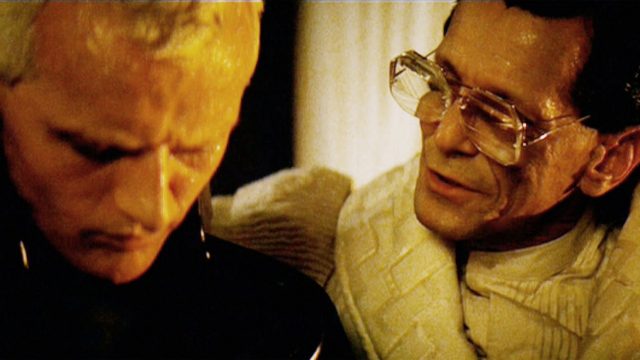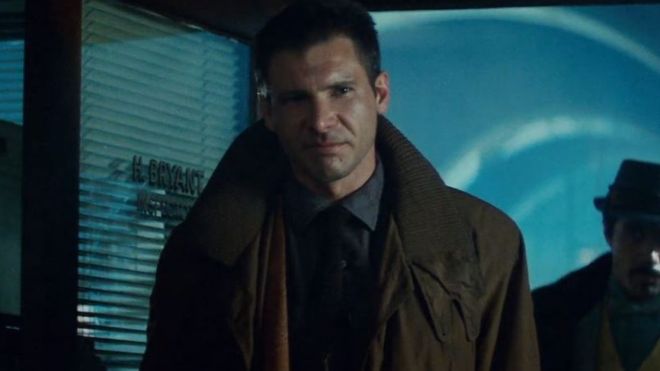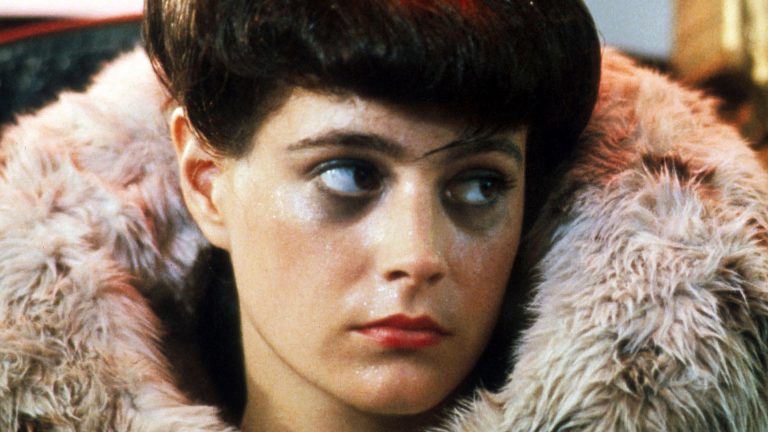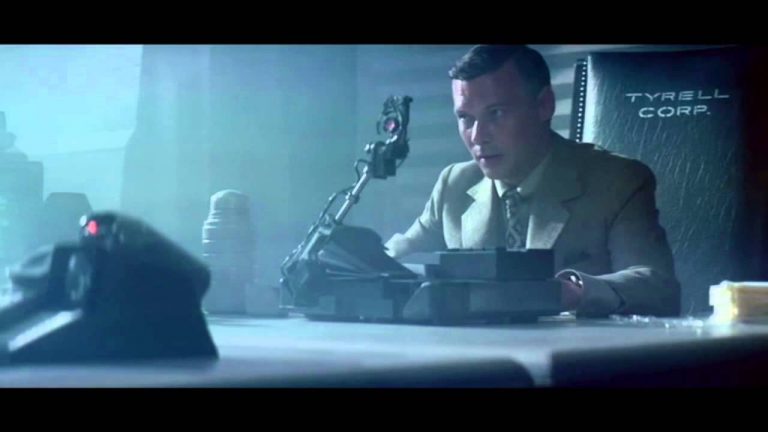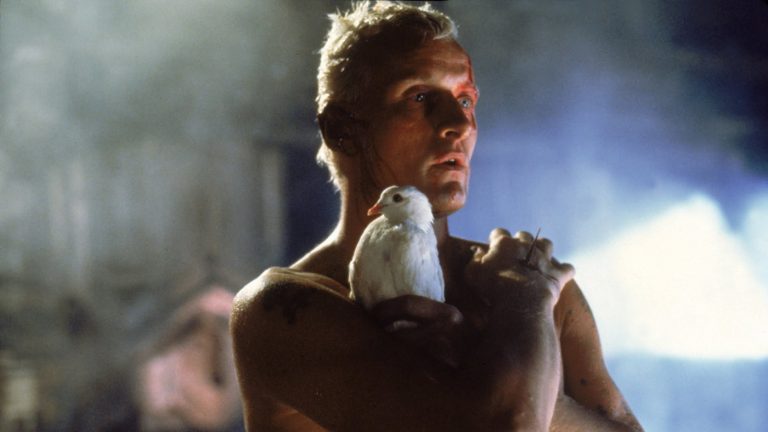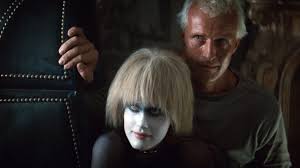Blade Runner is set in November 2019, the same month this article will be posted. The future, of course, keeps moving further out—Do Androids Dream of Electric Sheep? originally staged its action in 1992—but that doesn’t matter. It matters even less here than it does with science fiction as a whole (and SF is a genre that, quite rightly, still has a lot of use for futures that never happened). Blade Runner isn’t about what will become of us but about where our individual loyalties are going to fall—do we bet on the present or the future? Cynical acceptance or risky, possibly fatal struggle?
It’s a genre question. The movie’s ideological conflict is between Rick Deckard (Harrison Ford), who is the noir half of the film, and Roy Batty (Rutger Hauer), who is the science fiction half. Deckard is a Hammett-style professional, devoted to the work and to his honor as he understands it; Roy is a revolutionary who cannot exist in the world as it is. The tension of Blade Runner is partly the tension of wondering what set of genre rules the film is following. Is this a universe capable of change?
Deckard would, presumably, say no. Scott and Harrison drown him in hardboiled signifiers, giving him a trenchcoat and booze and an attitude that is alternately cocky and wearily disapproving. His political position—half-establishment insider, half-outsider—is a familiar one, but the film gives it a particularly cynical spin. Deckard’s disaffected independence is a pose, and he drops the reality of it as soon as it becomes clear what the consequences would be: “You know the score, pal. If you’re not a cop, you’re little people.” He construes that as him having “no choice”—better to be a part of the system than have nothing.
(The version of the film with the voiceovers included has Deckard explicitly saying that he believes the “little people” line is a threat against his life. If it is, it’s a pretty oblique one—but one that would go a long way towards backing up that “Deckard is a replicant” theory. Retirement equals death. In Blade Runner: The Final Cut, without Deckard’s narration, “retirement equals death” doesn’t feel like anything more than a metaphor.)
He has no real ideological objection to the replicants. To the extent that his motivations are noble, they’re part and parcel with Sam Spade’s:
When a man’s partner’s killed, he’s supposed to do something about it. It doesn’t make any difference what you thought of him, he was your partner, and you’re supposed to do something about it. And it happens we’re in the detective business. Well, when one of your organization gets killed, it’s – it’s bad business to let the killer get away with it. Bad all around. Bad for every detective everywhere.
He may have to be spurred into it by the higher-ups, but that motivation does work dramatically: Leon kills Holden as the inciting incident, and Deckard comes back to finish Holden’s investigations and executions. This fits for his overall characterization, too, individually and thematically. Deckard’s concerns, muted though they are, are individual competence and individual connection. His painstaking appraisal of Leon’s photograph is strangely thrilling—the perfect combination of impossible technology and inventive thinking. He can be kind: there’s a halting, awkward sweetness to him offering Rachael (Sean Young) a drink, like it’s the one reassuring, chivalric gesture he can think of. He may dream of unicorns, but he lives in Los Angeles—you give an imperiled maiden a drink because that’s all that’s available.
He wants to save Rachael—but, queasily, he wants to first make sure that, in doing it, he’s saving the woman who loves him. He’s willing to risk himself, but he needs his reasons for doing so to be personal, not ideological.
Maybe he would save Rachael anyway, of course. But he falls in a kind of love with her, believing—ostensibly—in her personhood, without ever letting that affect how he reacts to the other replicants. Saving Rachael doesn’t and can’t overturn the world. All Deckard hopes for is an exception.
That fits the universe he believes he’s living in. In noir, a single exception—maybe an escape from corruption and malaise—is all you can realistically hope for.
And he may be right about the conditions of his reality. The worldbuilding in Blade Runner is terrific—SF films live and die by how much they can leave unexplained, and Blade Runner is full of tips of the iceberg that successfully imply enormities beneath the surface. But there’s no piece of background more intriguing, or more integral, than the current status of animals. The Voight-Kampff test is supposedly a test of empathy, but it’s rigged; at its core, it’s a test of how ethically you imagine yourself performing under moral dilemmas you have never and will never encounter. Realistically, and plausibly, what it’s really testing is unsubstantiated moral superiority—which makes it a good test, really. Humans are very good at a sense of unsubstantiated moral superiority. How do you feel about this object that is generally agreed to be sympathetic? The right way? Okay, let’s move on. The animal questions are safe because, by and large, there are no more real animals; you can love them without being required to do anything.
And as the animals are off-screen, and can’t argue for themselves in any case, then it’s fine to say that empathy with animals is a fundamental part of humanity. There’s not much danger in anyone pointing out that if that were true, presumably more of the animals would still exist. You can tell a lot about someone by their moral barometers and by whether or not they think the greatest sins are ones they stand a remote chance of committing. The Tyrell Corporation, of course, puts the evil elsewhere. You wouldn’t hurt an animal. Not when there are no animals around to hurt. (You would have a slave, naturally—it’s a compelling reason to go off-world. But that’s different.)
These are the rules Deckard has always been presented with. Animals are good. People are neutral. Replicants are either an out-of-sight part of the economy or a present problem. He responds to Rachael not just because she’s beautiful but because, crucially, she’s been betrayed by the system in a way that breaks the rules. She was lied to. It was Tyrell who took her out of the categories Deckard was familiar with; Tyrell who muddied the waters. Deckard responds to the unfairness of it in a way that he can’t respond to the various invisible injustices of his world.
He is, in the end, a cop. He enforces the existing rules without having an opinion on whether or not they should exist, and he enforces them only on his turf. The present—the way things are—is inviolable. Deckard and the Problem of Rachael could be moved to any time and any society.
This is all talking about a reality governed partly by Deckard’s perceptions, of course. The logistical, literal boundaries of possibility in this Los Angeles are hard to determine. When Roy confronts Tyrell about whether or not there’s anything that can extend his life, Tyrell has a calm scientific objection to every potential solution Roy offers. Is he lying? Who knows? It’s impossible to tell—Roy is already out of time. There’s no way to judge whether or not existing replicants, at least, are capable of being given human lifespans; no way to tell whether or not it’s possible to make amends. As it currently stands, they may be locked into inescapable inequality.
But only as it currently stands. If this is noir, that continues; if this is science fiction, then the future is still up for grabs. And it’s possible, in science fiction, to tamper with that, to make what can be done yield to what should be done, to make the muddled present yield its concrete reality to some abstract truth.
And the abstract truth here, the moral right, is as clear as anything in Blade Runner‘s world is likely to get: the boundary between naturally occurring and constructed is either porous or impossibly fine.
This comes up over and over again in the final fight between Roy and Deckard. Deckard is clothed in his trenchcoat, protected from the world, while Roy strips off his shirt, becoming much more of a physical, natural part of the world around him. If animals are the lost object of pure empathy, it’s Roy who connects with them, experimentally howling like a wolf to vent something elemental and savage. Deckard is silent, and Roy is hyper-verbal—it’s impossible to miss, at this point, that he has a self and, with it, a life.
Humans and replicants are equal in Blade Runner’s moral landscape. In fact, if there’s an inequality there, it’s in the replicants’ favor: they express more conscience (“I’ve done… questionable things”), more fellow feeling, and more empathy to their enemies than the humans ever do. So the issue isn’t even what should be done but what will be done (marking another genre difference, this time between the utopian and the mimetic)—the issue is what Deckard is willing to commit to, willing to risk his life for, willing to kill for.
Because there’s just enough of a chance that the world can change to make fighting for that change a pressing question. Memories can be tampered with and artificially installed, changing the past. Records are fuzzy, allowing people to vanish without a trace. Corporate barons die like anyone else.
Which brings us to Roy Batty, played by Rutger Hauer with an amused, crackling intensity. It’s almost beside the point to say that he radiates a kind of raw, open sexuality—he radiates a raw, open everything, as if every nerve ending he has is alive and conscious.
Roy is political and partisan in a way that Deckard obviously isn’t and that Rachael can’t be, simply because she isn’t from the world of replicants in the same way. There is no way for Roy to separate the political from the personal when his entire life, from his slavery to the deaths of his friends and lover to his deliberately abbreviated lifespan, has been shaped by political decisions made on Earth. His explicit fuck-you goal is to extend his life and the lives of his companions—and, significantly, to extend their lives for the sake of their lives. He loves Pris, who loves him in return, but at no point does he or anyone else argue that that’s why they should be saved. Romantic love is often presented as the one acceptable reason for aren’t-they-sweet protest in dystopias—it’s why the almost double-suicide of Katniss and Peeta in The Hunger Games has to be publicly framed as a Romeo and Juliet love story, and it’s why the clones in Never Let Me Go (naively) think they might be allowed to even temporarily defer their final organ donations. Romance-as-motivation can exist in Deckard’s noir universe—as, in fact, it exists for Deckard himself—and that’s because it’s individualistic, Romantic-with-a-capital-R. All it really asks for is an exception, and, for that matter, an exception made because of a merit that the other side approves of.
And it’s never something that comes up here. They should be saved because it’s right, because they demand it, and because there are others who can’t demand it. Roy is actually not at all interested in making arguments about why he should get a longer life span; he’s interested in making it happen. When it seems it can’t happen, he’s not interested in resignation but in retribution.
Any revolution demands that the people in it care less about their individual selves and more about their shared identity and the change they want to bring, and when Roy dies, he dies defiantly asserting not just the value of his life but the value of a replicant life—with that life existing on its own terms rather than aspiring to humanity’s. Imagine how terrible it would be if his last words were about how, dammit, he loved, he had a heart like anyone else, he felt pain, he felt loneliness. If he had died insisting he was human.
Instead, we have one of the most beautiful, defiant, accepting death scenes in cinema:
I’ve seen things you people wouldn’t believe. Attack ships on fire off the shoulder of Orion. I watched C-beams glitter in the dark near the Tannhauser gate. All those moments will be lost in time… like tears in rain… Time to die.
Roy could have changed the world. But he burns out, and we’re left with Deckard and Rachael, who are trying to survive without damaging anything or anyone in a way the world cares about. Their retreat is hopeful—but it’s hopeful only for them.
The combined effect of these last few scenes is to make Blade Runner noir with an enormous attached question mark, noir that is science fictionally poking at the limitations and rules of its world.
Gaff (Edward James Olmos) says to Deckard, re: Rachael, “It’s too bad she won’t live. But then again, who does?”
It’s darkly poetic, true, and again, one of the most striking lines the movies have to offer. In its odd acceptance of the fundamental tragedy of the universe, it has—suitably for Gaff—a strange kind of absurdist joy to it. (We’re all going to die, might as well make some paper animals.) There is a kind of fairness here despite everything, Gaff implies, and he’s not necessarily wrong.
But at the same time, it’s a profound acceptance of the way things are, in a way that equates the deliberately blocked lifespan of the replicants with the natural chancy lifespans of humans. No one lives. But the length of days, in this case, isn’t given out justly or divinely. The rebellious underside to Gaff’s moving fatalism is shown when Tyrell offers Roy pablum: “The light that burns twice as bright burns half as long—and you have burned so very, very brightly, Roy… [you’ve done] extraordinary things. Revel in your time.”
In response to which Roy kisses him—and kills him.
My angle on this article was shaped very much by my reading of Son of Griff’s excellent essay on Chinatown and the politics of noir.

